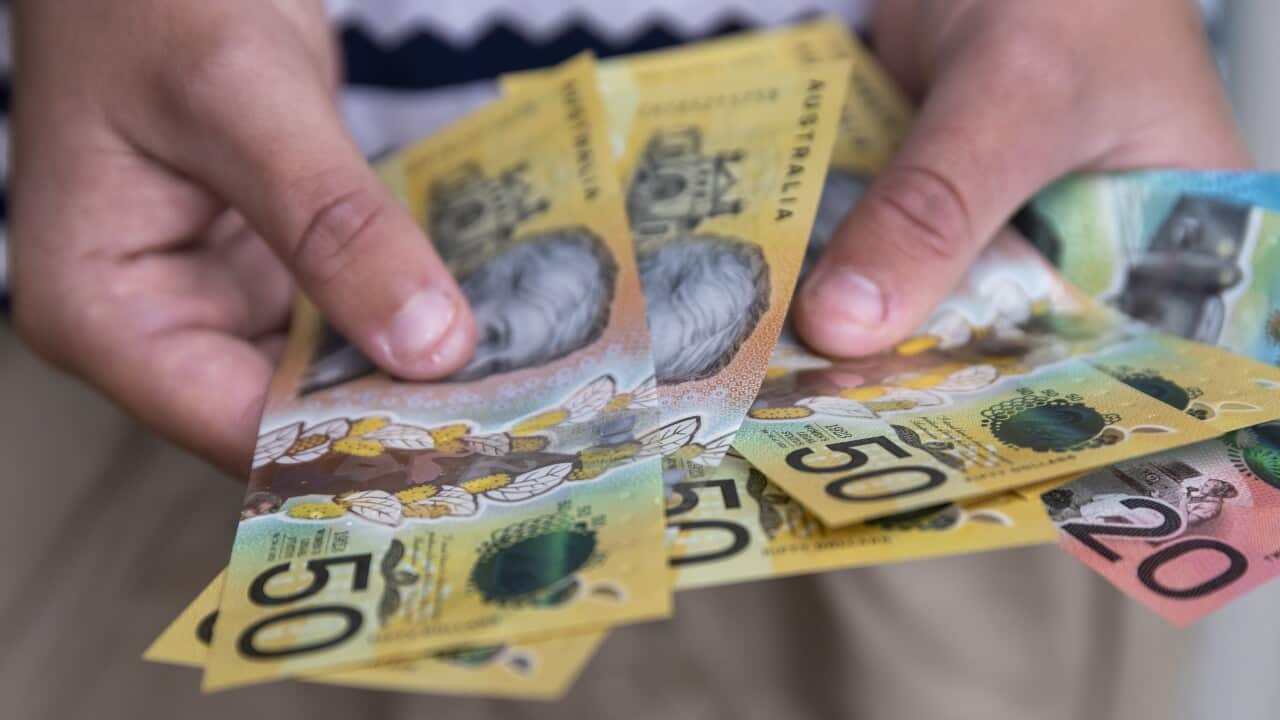When Ava Martina started busking her melodies were accompanied by clinking of coins.
“Before the pandemic, I feel like cash was much more acceptable. Since the pandemic, a lot of places have switched,” Martina said. “With busking, that was kind of the main source of income.”
To adapt to an increasingly cashless society, Martina adopted QR codes so people could donate digitally.
“People got really used to scanning QR codes, so it’s almost become quite a natural process for people,” she said.
“You can access it from a distance, some people feel a little bit uncomfortable coming up real close to drop that coin in front of you.”
Musician Ava Martina has had to adapt to an increasingly cashless society. Source: Supplied / Monique Lewis
Cash was once a staple in the economy, but it’s fast becoming a relic of the past.
Just a decade ago, more than half of transactions were cash. Now it’s just one in seven, and it’s happened at an alarming rate, according to Steve Worthington, an adjunct professor at Swinburne University’s School of Business, Law, and Entrepreneurship.
“The COVID pandemic turbocharged the reduction of the number of merchants, as we call them, who accept cash,” Worthington said.
“As consumers, we’ve become very used to using either a card or a digital wallet to make payments.”
The major change is impacting everyone, from vulnerable Australians to businesses.
The consumer
There are undeniable benefits to going cashless, and most Australians prefer to use card.
It’s faster, you don’t have to carry cash, and card payments are accepted by 97 per cent of merchants, according to research by the Reserve Bank of Australia (RBA).
But digital payments have shortfalls, including their reliance on the internet — which can prove problematic in times of crisis.
“We had examples in the bushfires down the south coast,” said John Hawkins from the University of Canberra School of Politics, Economics, and Society. “The people who had a bit of cash on them didn’t have a problem. The people who had no cash did have a problem.”
Cash courier company Armaguard recently had a scare, and required a cash injection of tens of millions of dollars to stay afloat. Source: AAP / Melanie Foster
The transition away from cash has also had a disproportionate impact on vulnerable people, according to Anglicare Australia executive director Kasy Chambers.
“We see that bank accounts are difficult to get for young people, for newly arrived migrants,” Chambers said.
“Anglicare Australia works a lot with children who live in out-of-home care. As they grow up in foster care or even residential group care, it can be very difficult for them to prove their identity.”
There are also benefits to using cash, Worthington said, one of them being that no surcharges are applied to cash payments.
There was a 77.5 per cent increase between 2019 and 2022 in the number of in-person payments by credit and debit card that attracted a surcharge, according to a November report by the RBA.
They typically added between 0.5 to 1.5 per cent to the cost of a purchase.
Cash is also tangible and can aid in budgeting and financial literacy, Worthington said.
“In the current cost of living crisis, people are getting a bit more wary about forever and not knowing really what they paid,” he said.
The retailer
Businesses don’t have to accept cash, but most do.
Indeed, the RBA reports that 94 per cent of physical businesses accept cash payments.
“For many small businesses, they’ll make decisions based on what suits their particular cohort of customers,” said Luke Achterstraat, CEO of the Council of Small Business Organisations Australia.
“We would provide some caution to small businesses that are going down that path (of not accepting cash). We saw during the , that meant that a lot of electronic payment terminals were simply not in operation for up to a whole day.
“Putting all your eggs in one basket would apparently bring with it some risk.”
The banker
It’s becoming harder to access cash, especially outside major cities.
Hawkins said the lack of cash use has led to bank and ATM closures.
“There are fewer people who use them, fewer people who go into the bank branch now to withdraw cash,” he said. “So there are fewer branches that are viable.”
As cash has become scarcer, it’s become more expensive to transport. recently had a scare, and required a cash injection of tens of millions of dollars to stay afloat.
“With the reduction in the use of cash, that has increased the unit cost of them providing cash to the various supply chains,” Worthington said.
“Australia is a huge country, and when we’re talking about delivering cash to regional areas, there’s a lot of mileage involved.”
What is the future for cash?
The federal government and the RBA are committed to keeping cash as a payment option in Australia, but the central bank’s governor Michele Bullock has said the cost of providing cash services is becoming more expensive.
It’s these increasing costs that make Hawkins wonder if we could see businesses apply a surcharge for cash payments.
“It could be that … they actually charge you more if you want to pay with cash than if you pay electronically,” he said.
But if that happened, businesses would likely face a “big backlash”, Bullock said in December.
The Australian Banking Association has also said the nation “will not be cashless any time soon”.
But Worthington said the ultimate fate of notes and coins lies in the hands of consumers.
“If you don’t use it, you’re going to lose it,” he said.
“The less and less we’re able to access and use cash, the more likely it is that we will lose access to it the same way we have with paper cheques.”




